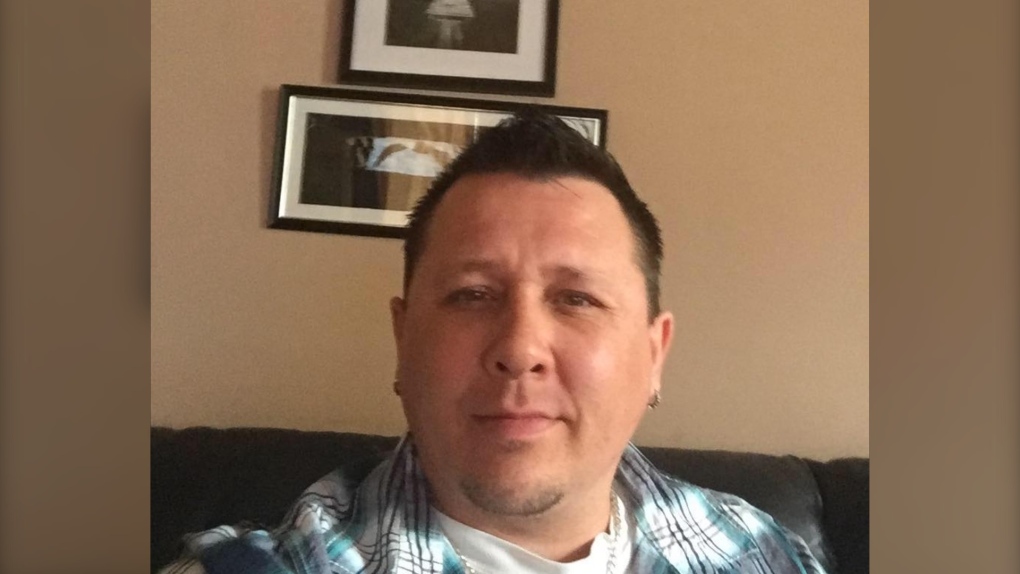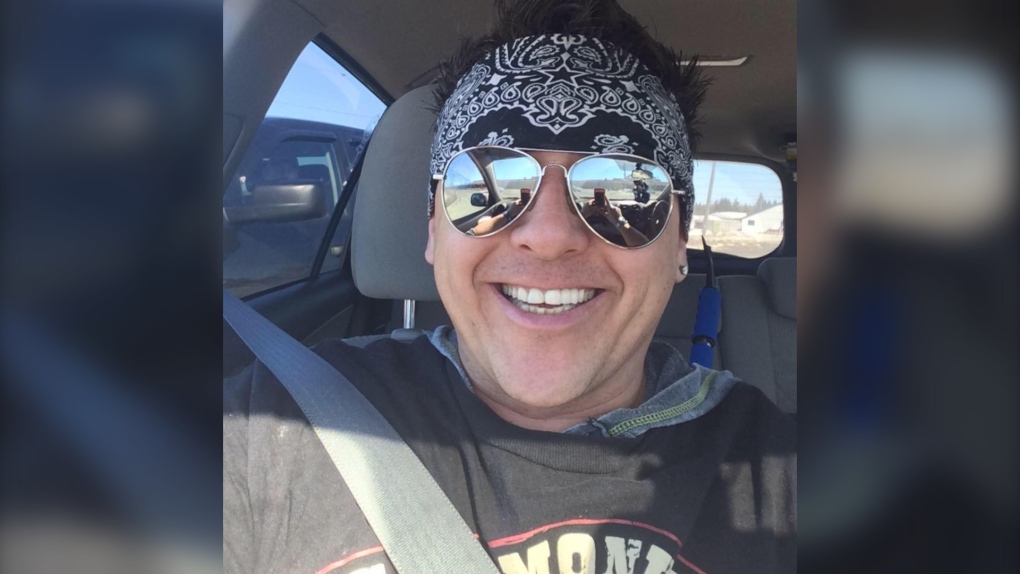Coroner's inquest begins in death of Indigenous man shot by northern Ont. police
Three northern Ontario police officers who shot and killed an Indigenous man four years ago were cleared of wrongdoing and now a coroner's inquest is underway to prevent similar incidents in the future.
The online video inquest began Monday morning, is expected to last five days and hear from 10 witnesses.
Shot to death
John-Paul (Jay) George, 42, died in hospital of multiple gunshot wounds to the torso April 9, 2020, after being shot by Ontario Provincial Police officers responding to a reported break-in at a home in New Liskeard, Ont.
 John-Paul George, 42, died in hospital of multiple gunshot wounds to the torso April 9, 2020, after being shot by Ontario Provincial Police officers responding to a reported break-in at a home in New Liskeard. (Facebook)
John-Paul George, 42, died in hospital of multiple gunshot wounds to the torso April 9, 2020, after being shot by Ontario Provincial Police officers responding to a reported break-in at a home in New Liskeard. (Facebook)
At the home, the officers were approached by a woman who said she thought someone was still inside her house located at the corner of Lakeshore Road North and Wedgewood Avenue.
A man was seen exiting the rear door of the home carrying what looked like a handgun, the Ontario Special Investigations Unit report said.
He was told to drop the gun, but when he did not comply, he was shot and later succumbed to his injuries in hospital, the report said.
Following an investigation, SIU found no reasonable grounds to charge the officers with a criminal offence in January 2021.
Indigenous overrepresentation
Etienne Esquega is the presiding officer in the inquest that will explore the circumstances of George's death, looking at police practices and training related to the use of force, de-escalation and prevention.
 John-Paul George, 42, died in hospital of multiple gunshot wounds to the torso April 9, 2020, after being shot by Ontario Provincial Police officers responding to a reported break-in at a home in New Liskeard. (Facebook)
John-Paul George, 42, died in hospital of multiple gunshot wounds to the torso April 9, 2020, after being shot by Ontario Provincial Police officers responding to a reported break-in at a home in New Liskeard. (Facebook)
The inquest aims to also look into how officers interact with people who appear to have a firearm and how they deal with mental health crises and drug use.
The overrepresentation of Indigenous Peoples and people with mental health challenges involved with police interactions will also be explored.
Grieving family
The first two witnesses to testify were George's mother Anne Commando-Dube and sister Tina Broderick.
The family is from Matachewan First Nation, more than 100 kilometres west of New Liskeard, and the two women spoke about how they all reconnected with their culture despite intergenerational trauma on both sides of the family.
The inquiry heard of George witnessing domestic violence growing up and experiencing separation from his former partners and kids.
The inquiry heard a rundown of George's medical history, which included chronic pain after being severely injured in a traumatic motor vehicle crash in June 2013.
He then developed significant substance abuse issues, cognitive impairment, post-traumatic stress disorder (PTSD), major depression and chronic anxiety. He was also hospitalized a couple of times for suicidal ideation.
His sister spoke of supporting her brother through his physical healing journey and how close they were.
No one called the family
George was shot and killed around 8:30 p.m. on the Thursday before the Easter weekend in 2020.
Commando-Dube said she had to call the Temiskaming detachment Friday morning to find out it was her son who was involved.
She said the loss of a child is the most horrific thing that can happen to a parent and the loss has an ongoing impact on the whole family.
"I cried so much, I could fill Lake Superior," the grieving mother said.
"Part of your heart is scarred for life."
She said it has only been in the last three months that they have learned the details of what happened the night her son was killed and they still have lots of questions.
No show witnesses
There were two witnesses scheduled to testify Monday, but they didn't show up.
Sonya Deering and her father Darrell did not appear as requested, so the inquest heard the 911 call made by Darryl the night of the incident about someone breaking into his daughter's house.
An audio recording of the OPP interview with Sonya about the break-in and how she knew George was also played.
During the mother's testimony, she said the family went to George's home the morning after he died and a woman named Sonya Deering, who she didn't know, showed up saying she was there to get some of her stuff.
She was not allowed in and once the family went inside, Commando-Dube said the house had been ransacked.
This was unusual because George typically was known to keep a neat and tidy home.
The medications he had picked up on Monday were notably missing, his sister told the inquest.
Reports of a grenade
While the family was at the home trying to figure out what to do with George's belongings, detectives in suits showed up saying they received a report about a grenade in the house.
The family had to break into the gun safe to allow the police to check, but no grenade was found.
The inquest continues Tuesday.
After all of the evidence and testimony is heard, a jury will make recommendations on how to prevent similar incidents in the future.
CTVNews.ca Top Stories

Canadian killed near Gaza border after threatening forces with knife: Israeli police
Israeli police say a Canadian citizen was killed Monday after threatening Israeli security forces with a knife near the Gaza border.
Hollywood reacts to Joe Biden exiting the U.S. presidential race
Hollywood was quick to react to the news that U.S. President Joe Biden was ending his bid for re-election and endorsing Vice President Kamala Harris.
What to know about the Canadian ties of Kamala Harris, Biden's choice for successor
U.S. President Joe Biden is stepping aside as the Democratic candidate in that country's November election and throwing his support behind Vice President Kamala Harris -- a Montreal-area high school graduate who spent several years in the city.
The pilot who died in crash after releasing skydivers near Niagara Falls has been identified
Officials on Sunday released the name of a pilot who died in a skydiving flight after her passengers jumped from the aircraft near the Niagara Falls.
Markets bet on second Bank of Canada interest rate cut coming this week
Economists and market watchers are betting the Bank of Canada will deliver another interest rate cut this week amid mounting evidence that inflation is sustainably easing.
10,000 unionized employees return to work, stores to reopen Tuesday: LCBO
Workers are back on the job today at Ontario's main liquor retailer, but the Liquor Control Board of Ontario says stores won't be open for business until Tuesday.
Canadian musicians struggle to get visas to perform in the U.S., some cancel shows
Backlogs and processing delays of temporary U.S. visas required by entertainers, athletes and artists has forced some Canadian bands to cancel U.S. tour dates because paperwork wasn't processed in time.
Harris looks to lock up Democratic nomination after Biden steps aside, reordering 2024 race
U.S. Vice President Kamala Harris moved swiftly to lock up Democratic delegates behind her campaign for the White House after President Joe Biden stepped aside amid concerns from within their own party that he would be unable to defeat Donald Trump.
Justin Trudeau reacts to Joe Biden announcing he won't run for re-election
Prime Minister Justin Trudeau responded to the news that U.S. President Joe Biden won’t run for re-election Sunday, calling Biden a 'true friend.'

































